GWS co-captain Callan Ward talks about life on and off the football field ahead of his 150th AFL game
CALLAN Ward might be fearless on the footy field but there is one thing that scares the Giants co-captain to the core.
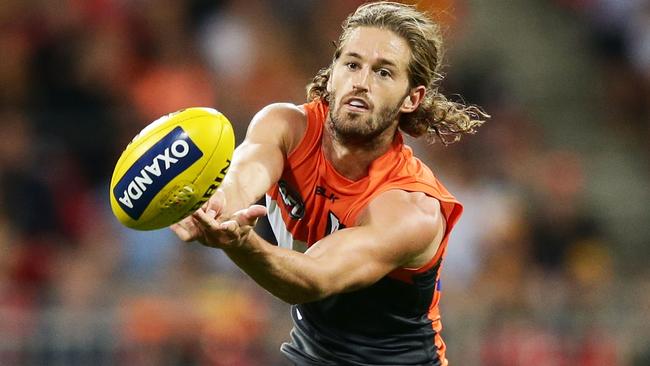
GWS
Don't miss out on the headlines from GWS. Followed categories will be added to My News.
CALLAN Ward lets his actions speak for everything.
Which is how he likes it.
Because there was a time when Ward didn’t speak at all.
As a kid, he had a stutter and fighting to get the necessary words out of his prepubescent mouth wasn’t worth it. The embarrassment was too much. There was one time, he said, when he was with his twin sister Aysha back in Braybrook, he was asked his name and he couldn’t spit it out.
Aysha, it seemed, was always by his side, always looking after her brother. “His name is Callan,’’ she’d say.
And Callan would be relieved again.
He has well conquered this impediment, although the threat of it strangling his throat in a live interview still holds him hostage.
You wouldn’t believe it hearing him speak. In post-match interviews as co-captain of Greater Western Sydney, Ward speaks with a simplicity and honesty in a similar matter to how he plays the game. No frills. Gets the job done. No grandstanding.
The fact is Ward was tempted to reject the multi-million dollar move from the Western Bulldogs to the Giants and with it the promise of being named co-captain, because he was afraid he would have to speak more.
“I definitely didn’t want to be co-captain,’’ he said. “I never wanted to do it at the Dogs when they were pushing me for a developing leadership role.
“As a kid, I had the speech impediment, I still stutter a lot now, and I never had the confidence to be a leader.
“When the Giants put the offer in, and offered the captaincy, I said no straight away. It actually nearly drove me away from coming up here. I didn’t want to be the guy who everyone looked up to and had to do all the media, it just wasn’t part of who I was.’’
His most frightening experience was being interviewed for The Footy Show in 2008, the year after being drafted by the Dogs as a 17-year-old. Ward was doing his VCE and he was interviewed in the classroom in front of the entire class of students.
“That was my worst nightmare, my first year of footy, in Year 12, I would never watch that interview again,’’ he said. “I remember watching it on The Footy Show and I was so embarrassed because I stuttered about eight times. I didn’t want to put myself in that position again.
“Even now, when I think about going on TV and especially when it’s live, I think what am I going to do if I stutter? People say it’s not noticed, but there’s something in my mind that keeps saying, don’t embarrass yourself.’’
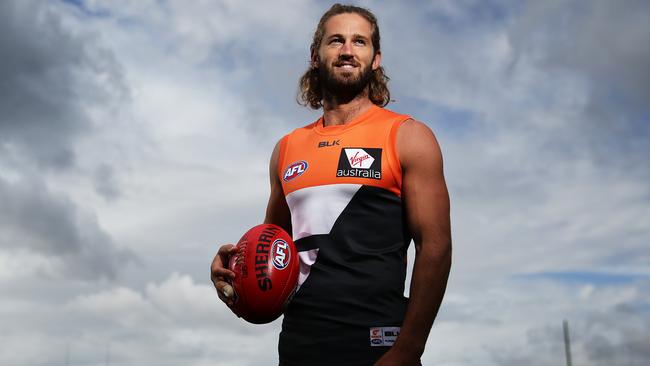
He says, however, he’s not embarrassed to talk about it.
“I’m not ashamed at all of the speech problems in the past. But definitely as a kid it was hard sometimes. I never had the confidence to get up and do oral presentations at all, even having conversations with adults.
“But when I look back at how far I’ve come since I started playing football, I am proud of how much I’ve matured.’’
Ward was the first big-name secured by the fledgling Giants. He was 21 and played 60 games. A local, his lifelong dream was to play for the Dogs forever.
The Giants, though, saw in him a player of rare quality — a young bull — and duly offered the rarest of contracts.
“To be honest, I wanted to stay at the Dogs and I tried to do everything I could to stay at the Dogs but in the end I had to go,’’ he said.
“To leave that footy club was the hardest decision I’ve had to make in my life and I still remember how difficult it was. But what was best for me was to go to the Giants and move to Sydney.’’
The money was pivotal. He wouldn’t say what the offer was, other than it was a “bit off’’.
It’s estimated he was earning about $230,000-$270,000 at the Dogs and it was reported the offer from the Giants was close to $800,000 a season over five seasons. The Dogs’ offer was in the $400,000 with pay rises to come.
He took the deal, was booed by the Dogs supporters in his final game of 2011 against Fremantle, which prompted his mother Kerri to lash out at the AFL for giving GWS “ludicrous’’ amounts of money to lure boys north.
The booing infuriated mum and so did Bulldogs fans ringing radio stations to abuse her son.
“In the end money was a big factor,’’ Ward said.
Ward signed that initial five-year deal at the end of 2011 and in March this year signed a second five-year deal. “That signing in March was almost to thank the club for getting me up here,’’ he said. “Since day dot, there’s been plenty of hard times, and to get opportunity to play until I’m 31, it’s a dream come true.’’
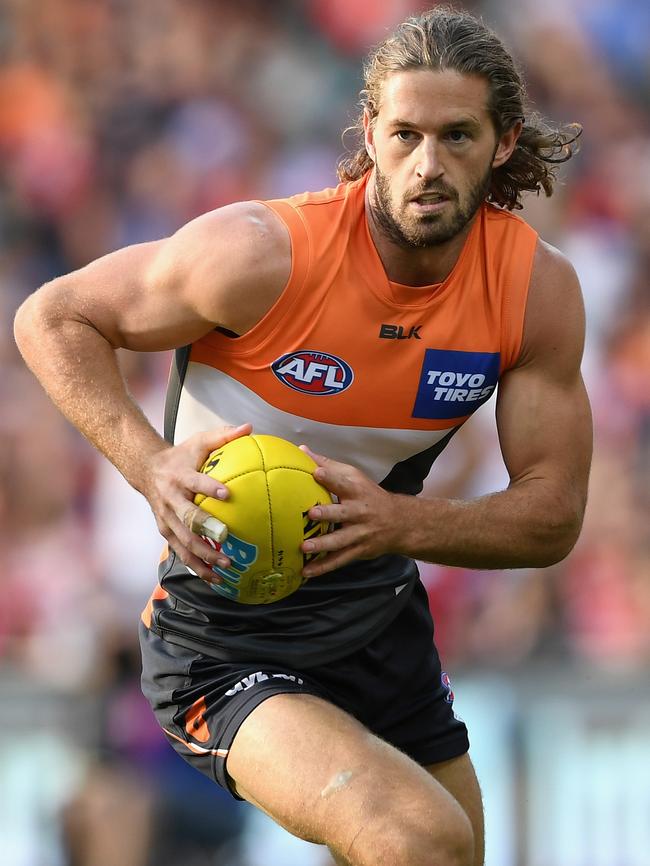
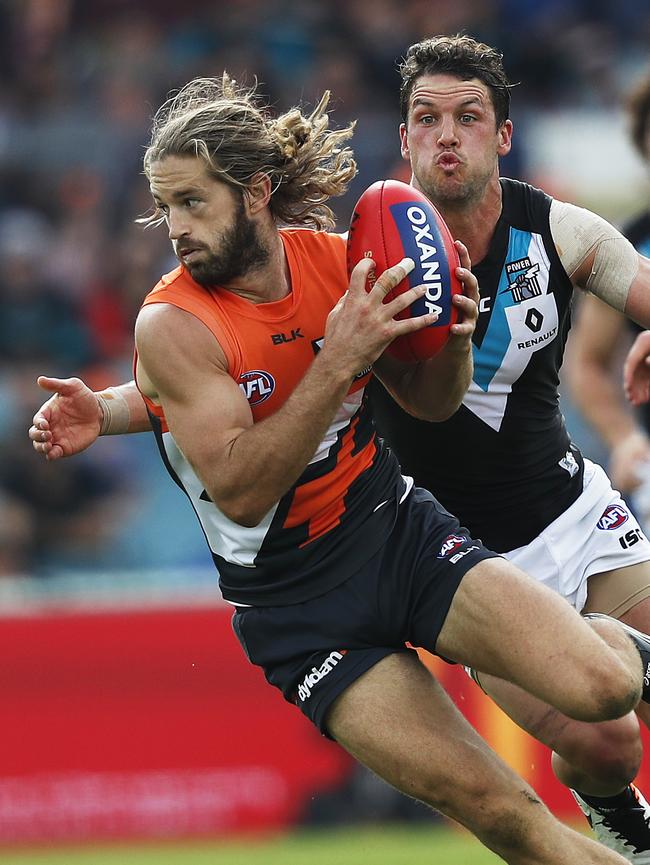
The pressure to perform on good coin as a 21-year-old never worried him. Again, no frills, no grandstanding.
“Looking back there was a heap of pressure on me, but I think pressure is overrated to be honest,’’ he said.
“There is pressure but if you don’t think about the pressure and don’t think the world is going to end if you fail, there’s no pressure. That’s the way I like to think anyway. I’ve always been a guy who’s kept things pretty simple. I’m up here playing footy, loving what I’m doing, and living a life I love to live. If it doesn’t work out, it doesn’t work out, you still have a life to live. There is pressure in the AFL world but there’s so many things out there in the world you can do, and people care about, and AFL is a just a small thing.
“I’ve always been interested in doing other things. I love the relationships I have with my family, and all my friends, my girlfriend Ruby and I think that’s the most important thing in my life, it’s more important that footy. The more you think footy is the most important thing, the more risk you are to failing.’’
Ward plays his 150th game Saturday against Fremantle.
From being a child with a stutter and no self confidence, he has emerged as one of the most respected players in the game. Not among the absolute elite skilled, mind you, but when has this sport been all about skill?
To describe Ward as a footballer is like trying to describe a summer thunderstorm: Brutal, unrelenting, awe-inspiring.
Ward and Joel Selwood, Nathan Fyfe, Luke Hodge, Rory Sloane, Patrick Dangerfield, even Mitch Robinson, have that same trait. There are inside mids and then there’s kamikaze inside mids.
“No, I don’t get intimidated by anyone,’’ he said. “I like those guys, a bit crazy and love the contested ball. Playing on them is exactly what I want, a) to learn and b) compete against them and challenge myself against the best.’’
Asked his attitude to playing, he said. “To go out there and enjoy the game and do everything I can to help the team win. That’s my attitude. That fearless stuff, it’s not something I think about, it’s just the way I’ve been brought up playing footy.’’
His dad Greg played Footscray under-19s and then senior football for Yarraville in the old VFA.
Ward didn’t see old man play but was told by dad’s mates he was “fearless, never shirk a contest, one of the toughest to have played’’.
Dad’s advice was to crack in, tackle and hit hard.
“I don’t remember any time I shirked a contest in the juniors, but I’m assuming I did, and he would’ve had a word after the game,’’ Ward said. “He used to watch every game and he would review my game when I was 15 and tell me what I did right and wrong. As young boy, he drove into me to try be as tough as I can out on the footy field.
“When I was growing up, I barracked for Essendon and everyone’s favourite players were James Hird and Matthew Lloyd. But mine was always Jason Johnson. He was never a star — (although Johnson was a dual best and fairest, 2001 and 2005) — but he was always in and under. It’s something I’ve always liked doing, getting in there and winning the ball yourself.’’
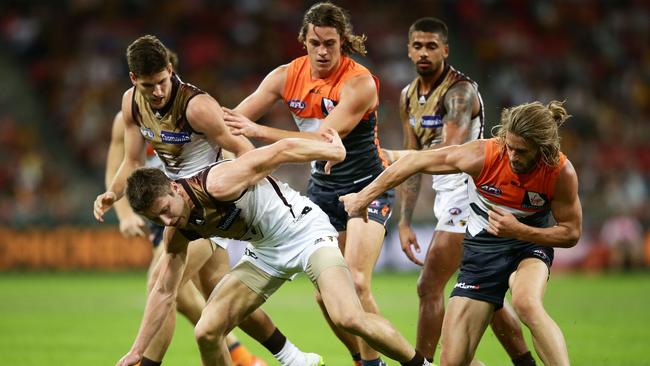
Ward co captains — with Phil Davis — a team making plenty of opposition teams nervous.
They are fifth of the ladder with a 5-4 win-loss record and last week belted the Hawks by 75 points. In Round 8, 2013, the Hawks crushed them by 83 points. The fear is growing.
For the first few seasons, Ward and is teammates lived the “very dark days’’, losing every week, training on a baseball field in Bankstown and sharing lockers with other athletes.
Today, their home is a legitimate football club at Olympic Park and they are a legitimate football team.
“It feels good,’’ Ward said. “I don’t want to play it up too much because this time last year, we were confident we would play finals and in the end it fell apart.
“But this year feels better, it feels like we’ve matured, it feels like when I was at the Dogs when we played the prelim years. I played two of those prelims and it feels like that. We are playing with heaps of confidence. We’ve got 22 guys and we trust every single player which is massive and another 10 players who can step in and play the role.’’
Play the role — it’s something Ward had to learn from day one at GWS.
When he was appointed captain, he didn’t know how to go about it. He remembers his first captains’ day with the other 17 captains and joining the likes Hodge, Nick Riewoldt, Jonathan Brown, Gary Ablett, Matthew Pavlich, Chris Judd and Joel Selwood.
“I was shitting myself,’’ he said.
The imagery of a young man, on a fat contract, with a nervous stutter waiting to spring from the shadows of childhood, can easily be imagined.
“There were some heavy hitters there and I was a little kid in the corner.’’
And now?
“It’s completely different. I still don’t think I’m one of them, but I’m a lot more confident and feel like I deserve to be there. I think I’ve earned the right to be there.’’
Not truer words have been spoken and, unquestionably, the same could be said about his footy club.


 “I don’t remember any time I shirked a contest in the juniors, but I’m assuming I did, and he would’ve had a word after the game."
“I don’t remember any time I shirked a contest in the juniors, but I’m assuming I did, and he would’ve had a word after the game." 



